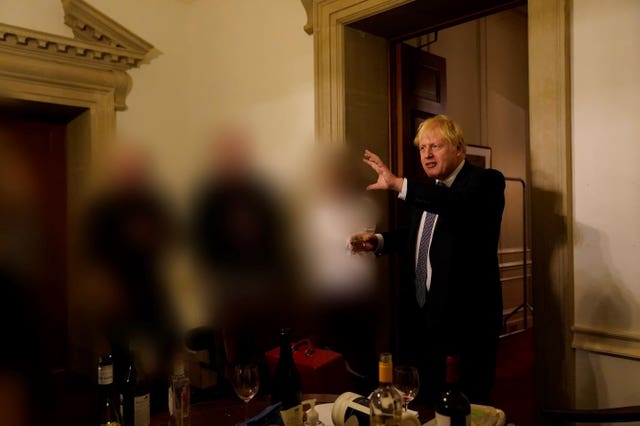Downing Street has warned allies of Boris Johnson against interfering in the inquiry into whether he lied to Parliament with his partygate denials.
Rishi Sunak’s official spokesman defended the Privileges Committee investigation as friends of the former prime minister sought to portray it as a “witch hunt”.
Mr Johnson’s written defence to the inquiry could be published as soon as today in the form of a lengthy submission from his barrister Lord Pannick KC.

Conor Burns, a Tory MP who served as a minister in Mr Johnson’s government, has raised questions about the committee’s chairwoman, the Labour grandee Harriet Harman.
And Tory peer Lord Greenhalgh backed a campaign for the four Conservative MPs on the Tory-majority committee to pull out of the “kangaroo court”.
The long-standing ally of Mr Johnson, who served under him at Westminster and City Hall, told Times Radio: “I’m concerned that it will be a witch hunt.”
The Prime Minister’s official spokesman responded by saying Mr Sunak “firmly believes it’s a matter for Parliament”, adding: “Parliament empowered the committee to carry out its work.”
He endorsed Commons Leader Penny Mordaunt’s warning that “a very dim view will be taken” of anyone who “tries to prevent them from carrying out this serious work”.
She also said the committee must be able to “work without fear or favour”.
Downing Street was also forced to deny it had delayed key announcements because of the distraction that will be caused by Mr Johnson’s inquiry appearance.
“It’s wrong to suggest Government business changes as a result of this committee hearing,” the spokesman said.
The hearing clashes with a key vote on Mr Sunak’s new Brexit deal for Northern Ireland, which Democratic Unionist Party MPs plan to oppose.
An estimated £220,000 of taxpayers’ money has been allocated for Mr Johnson’s legal bills, and allies insisted he expected his position to be “vindicated” after submitting a “detailed and compelling” account of his case.
If u get covid regs FPN u can either admit guilt or go to ct to challenge it. If PM and CX admit guilt, accepting that police right that they breached regs,then they are also admitting that they misled the House of Commons. Or are they going to challenge? https://t.co/jtk8bjj9mo
— Harriet Harman (@HarrietHarman) April 12, 2022
If the MPs believe he did mislead the House, they will consider whether it was “reckless or intentional” and amounted to a contempt of Parliament.
His lawyers have already queried the process being used by the Privileges Committee, including pushing for him to be legally represented at the hearing, arguing for a higher standard of proof than the balance of probabilities, and suggesting he must be shown to have intended to mislead Parliament for a contempt to have occurred.
After an interim report by the committee earlier this month said evidence strongly suggested breaches of coronavirus rules would have been “obvious” to the then-prime minister, Mr Johnson claimed it was “clear” that he had not committed a contempt of Parliament.
He said there was “no evidence in the report that I knowingly or recklessly misled Parliament” or failed to update it in a timely manner.
Mr Johnson has also sought to cast doubt on the findings of Sue Gray’s report on partygate, after she quit the civil service to take up a role in Labour leader Sir Keir Starmer’s office.
“Boris Johnson contests that but it seems to me the person who is chairing this committee has predetermined it and that causes me a degree of anxiety for Parliament’s reputation in handling this with integrity.”
The Privileges Committee is examining evidence around at least four occasions when Mr Johnson may have misled MPs with his assurances to the Commons that lockdown rules were followed.
He is expected to highlight previously undisclosed WhatsApp messages from senior civil servants and members of his No 10 team showing he had relied on their advice when he made his statements to Parliament.
Calling all @Conservatives: HELP #Boris + protect the integrity of our political system + the reputation of @UKParliament via @ConsPost https://t.co/bfbsuewpjS
— Stephen Greenhalgh (@team_greenhalgh) March 13, 2023
He will also publish messages which show other senior figures in Downing Street believed the gatherings were covered by the “workplace exemption” in the lockdown rules.
The committee will publish its findings on whether Mr Johnson committed a contempt of Parliament and make a recommendation on any punishment but the ultimate decision will fall to the full House of Commons.
Mr Sunak has said he will not seek to influence MPs on the committee and is expected to grant a free vote in the Commons on any sanction that may be recommended.
A suspension of 10 sitting days or more for Mr Johnson could ultimately trigger a by-election in his Uxbridge and South Ruislip seat, which he held with a majority of 7,210 in 2019.






